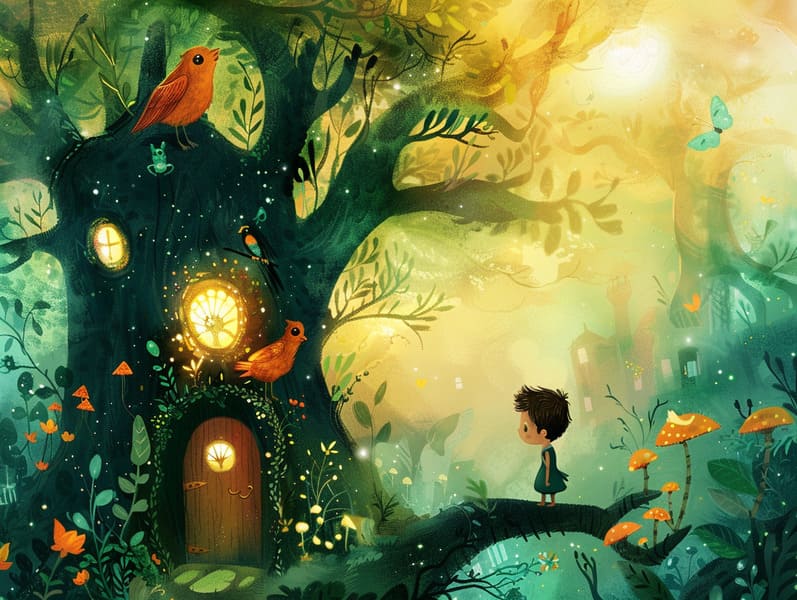Appreciating the Joy of Evening Fairy Tales: Building Beloved Moments with Your Loved Ones
Appreciating the Joy of Evening Fairy Tales: Building Beloved Moments with Your Loved Ones
Blog Article

Bedtime is a cherished time for caregivers and children. It’s a time to ease into rest, get cozy, and enjoy the wonder of nighttime tales.
For years, nightly tales for children have been a beloved custom, offering more than just a way to rest. They provide an chance for affection, education, and fostering inventiveness.
The Role of Bedtime Stories
Evening stories for little ones go beyond a way to close the day. They play a crucial role in a child’s maturation and in strengthening the guardian-child relationship. Here’s why they make a difference:
1. Together Time: Bedtime reading strengthens a special bonding moment between adults and their kids. It’s a moment of attachment that helps children feel important and reassured.
2. Language Skills: Absorbing tales helps children develop their linguistic abilities. They acquire new language, understand construction, and refine their hearing and grasping abilities.
3. Fantasy and Imagination: Narratives for little ones usher them to fantastic worlds, promoting imagination. They imagine characters, settings, and adventures, which sparks their fantasy.
4. Feeling Recognition: Bedtime narratives often showcase characters facing issues and sentiments. These stories help kids understand and address their own moods, developing emotional growth.
5. Mental Development: Being read a tale helps children develop awareness, recall, and analytical skills. They learn to follow narratives, remember components, and foresee consequences.
Making Stories a Bedtime Habit
Developing a night-time practice that involves reading narratives is effortless and beneficial. Here’s how to establish a valued part of your end-of-day habit:
1. Select a Comfortable Location: Opt for a cozy place where you and your child can get cozy without noise. A peaceful bed or a peaceful reading nook works ideally.
2. Choose a Set Time: Set a set time each night for bedtime stories. Regularity helps children be prepared and makes the practice more sustainable.
3. Choose Suitable Stories: Pick tales that are appropriate for your child’s cognitive level. Preschoolers might be drawn to easy books with uncomplicated narratives, while older kids may appreciate longer stories with more intricate narratives.
4. Make the Story Interactive: Make sure the tale be immersive by using different tones and voices, adding noises, and inviting your child to engage. Ask queries about the story to hold their attention.
5. Set a Relaxing Mood: Lower the lights, use quiet tones, and create a relaxing environment to help your child get ready for sleep.
How to Discover Bedtime Stories
There are numerous options where you can find perfect bedtime stories for children. Here are some suggestions to consider:
1. Kids’ Books: Explore your closest library or bookstore to find a varied selection of bedtime stories for kids. Exploring the shelves together can be a fun activity that also gives children to get stories that capture their interest.
2. Web Sources: There are many places online that offer free bedtime stories. Sites like Storyberries provide a variety of short stories for kids that you can access. These websites are great for finding new and different stories without fees.
3. Apps for Storytelling: For nights when you’re too worn out to read, explore audiobooks or storytelling apps. These can provide a relaxing voice to read your child a story, ensuring they still get their bedtime story fix. Apps often offer interactive features that can involve them further.
4. Personal Stories: Craft your own stories fitting your child’s preferences. Personalized stories can be remarkably engaging and meaningful. You can involve your child in the creation process, making them a part of the adventure.
Perks of Short Stories
Brief stories for children are highly great for bedtime. They provide all the good points of longer stories but are more brief, making them perfect for getting ready for bed before sleep. Here’s why short stories are a perfect choice:
1. Clear and Simple: Short stories are straightforward and simple for kids to grasp, even after a long day. They can easily grasp the plot and enjoy the story without becoming distracted.
2. Rapid Interest: Brief tales immediately engage children, keeping their engagement and curiosity. This makes them wonderful for keeping bedtime habits manageable yet enjoyable.
3. Various Options: Brief tales give for variety in your bedtime storytime. You can find a different story each night, keeping the practice interesting and exciting for your child.
4. Time Management: For busy parents, concise narratives are a fast way to confirm children still get their nightly dose of storytelling. They fit well into a full schedule while still offering the full plusses of a bedtime story.
The Happiness of "Read Me a Story"
The simple phrase, “Can you read to me?” can bring a world of magic for children. Responding to this request not only addresses a child’s want for attention and engagement but also establishes lasting memories. Here’s why it’s wonderful:
1. Relationship: Narrating to your child develops a deep emotional link. It’s a time for attachment, sharing, and bonding.
2. Heritage: Developing a bedtime story ritual creates a valued tradition that children anticipate every night. It’s a ritual that can be given through generations.
3. Learning and Growing Together: As you read aloud, you’ll observe your child’s growth and progress. Their queries, reactions, and understanding of the stories progress, offering insights into their developing minds.
4. Comfort Zone: Bedtime stories provide a safe space for children to deal here with emotions, face fears, and find comfort in the known presence of a parent.
Summing Up
Nightly tales for children are a vital tool for nurturing a child’s growth and building unforgettable memories of closeness.